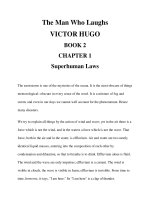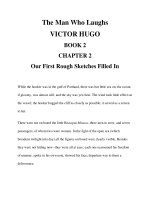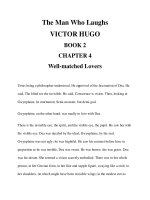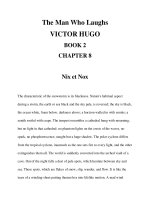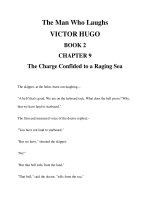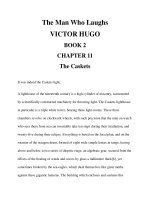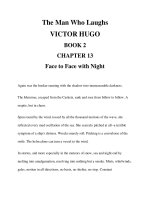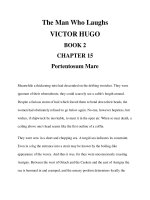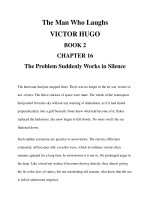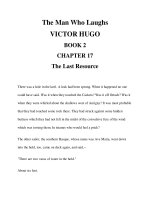The Man Who Laughs Victor Hugo Part 2 Book 9 Chapter 2 ppt
Bạn đang xem bản rút gọn của tài liệu. Xem và tải ngay bản đầy đủ của tài liệu tại đây (66.34 KB, 26 trang )
The Man Who Laughs
Victor Hugo
Part 2
Book 9
Chapter 2
The Dregs
Gwynplaine left the house, and began to explore Tarrinzeau Field in every
direction. He went to every place where, the day before, the tents and caravans
had stood. He knocked at the stalls, though he knew well that they were
uninhabited. He struck everything that looked like a door or a window. Not a
voice arose from the darkness. Something like death had been there.
The ant-hill had been razed. Some measures of police had apparently been
carried out. There had been what, in our days, would be called a razzia.
Tarrinzeau Field was worse than a desert; it had been scoured, and every corner
of it scratched up, as it were, by pitiless claws. The pocket of the unfortunate
fair-green had been turned inside out, and completely emptied.
Gwynplaine, after having searched every yard of ground, left the green, struck
into the crooked streets abutting on the site called East Point, and directed his
steps towards the Thames. He had threaded his way through a network of lanes,
bounded only by walls and hedges, when he felt the fresh breeze from the water,
heard the dull lapping of the river, and suddenly saw a parapet in front of him. It
was the parapet of the Effroc stone.
This parapet bounded a block of the quay, which was very short and very
narrow. Under it the high wall, the Effroc stone, buried itself perpendicularly in
the dark water below.
Gwynplaine stopped at the parapet, and, leaning his elbows on it, laid his head
in his hands and set to thinking, with the water beneath him.
Did he look at the water? No. At what then? At the shadow; not the shadow
without, but within him. In the melancholy night-bound landscape, which he
scarcely marked, in the outer depths, which his eyes did not pierce, were the
blurred sketches of masts and spars. Below the Effroc stone there was nothing
on the river; but the quay sloped insensibly downwards till, some distance off, it
met a pier, at which several vessels were lying, some of which had just arrived,
others which were on the point of departure. These vessels communicated with
the shore by little jetties, constructed for the purpose, some of stone, some of
wood, or by movable gangways. All of them, whether moored to the jetties or at
anchor, were wrapped in silence. There was neither voice nor movement on
board, it being a good habit of sailors to sleep when they can, and awake only
when wanted. If any of them were to sail during the night at high tide, the crews
were not yet awake. The hulls, like large black bubbles, and the rigging, like
threads mingled with ladders, were barely visible. All was livid and confused.
Here and there a red cresset pierced the haze.
Gwynplaine saw nothing of all this. What he was musing on was destiny.
He was in a dream a vision giddy in presence of an inexorable reality.
He fancied that he heard behind him something like an earthquake. It was the
laughter of the Lords.
From that laughter he had just emerged. He had come out of it, having received
a blow, and from whom?
From his own brother!
Flying from the laughter, carrying with him the blow, seeking refuge, a
wounded bird, in his nest, rushing from hate and seeking love, what had he
found?
Darkness.
No one.
Everything gone.
He compared that darkness to the dream he had indulged in.
What a crumbling away!
Gwynplaine had just reached that sinister bound the void. The Green Box gone
was his universe vanished.
His soul had been closed up.
He reflected.
What could have happened? Where were they? They had evidently been carried
away. Destiny had given him, Gwynplaine, a blow, which was greatness; its
reaction had struck them another, which was annihilation. It was clear that he
would never see them again. Precautions had been taken against that. They had
scoured the fair-green, beginning by Nicless and Govicum, so that he should
gain no clue through them. Inexorable dispersion! That fearful social system, at
the same time that it had pulverized him in the House of Lords, had crushed
them in their little cabin. They were lost; Dea was lost lost to him for ever.
Powers of heaven! where was she? And he had not been there to defend her!
To have to make guesses as to the absent whom we love is to put oneself to the
torture. He inflicted this torture on himself. At every thought that he fathomed,
at every supposition which he made, he felt within him a moan of agony.
Through a succession of bitter reflections he remembered a man who was
evidently fatal to him, and who had called himself Barkilphedro. That man had
inscribed on his brain a dark sentence which reappeared now; he had written it
in such terrible ink that every letter had turned to fire; and Gwynplaine saw
flaming at the bottom of his thought the enigmatical words, the meaning of
which was at length solved: "Destiny never opens one door without closing
another."
All was over. The final shadows had gathered about him. In every man's fate
there may be an end of the world for himself alone. It is called despair. The soul
is full of falling stars.
This, then, was what he had come to.
A vapour had passed. He had been mingled with it. It had lain heavily on his
eyes; it had disordered his brain. He had been outwardly blinded, intoxicated
within. This had lasted the time of a passing vapour. Then everything melted
away, the vapour and his life. Awaking from the dream, he found himself alone.
All vanished, all gone, all lost night nothingness. Such was his horizon.
He was alone.
Alone has a synonym, which is Dead. Despair is an accountant. It sets itself to
find its total; it adds up everything, even to the farthings. It reproaches Heaven
with its thunderbolts and its pinpricks. It seeks to find what it has to expect from
fate. It argues, weighs, and calculates, outwardly cool, while the burning lava is
still flowing on within.
Gwynplaine examined himself, and examined his fate.
The backward glance of thought; terrible recapitulation!
When at the top of a mountain, we look down the precipice; when at the bottom,
we look up at heaven. And we say, "I was there."
Gwynplaine was at the very bottom of misfortune. How sudden, too, had been
his fall!
Such is the hideous swiftness of misfortune, although it is so heavy that we
might fancy it slow. But no! It would likewise appear that snow, from its
coldness, ought to be the paralysis of winter, and, from its whiteness, the
immobility of the winding-sheet. Yet this is contradicted by the avalanche.
The avalanche is snow become a furnace. It remains frozen, but it devours. The
avalanche had enveloped Gwynplaine. He had been torn like a rag, uprooted
like a tree, precipitated like a stone. He recalled all the circumstances of his fall.
He put himself questions, and returned answers. Grief is an examination. There
is no judge so searching as conscience conducting its own trial.
What amount of remorse was there in his despair? This he wished to find out,
and dissected his conscience. Excruciating vivisection!
His absence had caused a catastrophe. Had this absence depended on him? In all
that had happened, had he been a free agent? No! He had felt himself captive.
What was that which had arrested and detained him a prison? No. A chain? No.
What then? Sticky slime! He had sunk into the slough of greatness.
To whom has it not happened to be free in appearance, yet to feel that his wings
are hampered?
There had been something like a snare spread for him. What is at first
temptation ends by captivity.
Nevertheless and his conscience pressed him on this point had he merely
submitted to what had been offered him? No; he had accepted it.
Violence and surprise had been used with him in a certain measure, it was true;
but he, in a certain measure, had given in. To have allowed himself to be carried
off was not his fault; but to have allowed himself to be inebriated was his
weakness. There had been a moment a decisive moment when the question
was proposed. This Barkilphedro had placed a dilemma before Gwynplaine, and
had given him clear power to decide his fate by a word. Gwynplaine might have
said, "No." He had said, "Yes."
From that "Yes," uttered in a moment of dizziness, everything had sprung.
Gwynplaine realized this now in the bitter aftertaste of that consent.
Nevertheless for he debated with himself was it then so great a wrong to take
possession of his right, of his patrimony, of his heritage, of his house; and, as a
patrician, of the rank of his ancestors; as an orphan, of the name of his father?
What had he accepted? A restitution. Made by whom? By Providence.
Then his mind revolted. Senseless acceptance! What a bargain had he struck!
what a foolish exchange! He had trafficked with Providence at a loss. How
now! For an income of £80,000 a year; for seven or eight titles; for ten or twelve
palaces; for houses in town, and castles in the country; for a hundred lackeys;
for packs of hounds, and carriages, and armorial bearings; to be a judge and
legislator; for a coronet and purple robes, like a king; to be a baron and a
marquis; to be a peer of England, he had given the hut of Ursus and the smile of
Dea. For shipwreck and destruction in the surging immensity of greatness, he
had bartered happiness. For the ocean he had given the pearl. O madman! O
fool! O dupe!
Yet nevertheless and here the objection reappeared on firmer ground in this
fever of high fortune which had seized him all had not been unwholesome.
Perhaps there would have been selfishness in renunciation; perhaps he had done
his duty in the acceptance. Suddenly transformed into a lord, what ought he to
have done? The complication of events produces perplexity of mind. This had
happened to him. Duty gave contrary orders. Duty on all sides at once, duty
multiple and contradictory this was the bewilderment which he had suffered. It
was this that had paralyzed him, especially when he had not refused to take the
journey from Corleone Lodge to the House of Lords. What we call rising in life
is leaving the safe for the dangerous path. Which is, thenceforth, the straight
line? Towards whom is our first duty? Is it towards those nearest to ourselves,
or is it towards mankind generally? Do we not cease to belong to our own
circumscribed circle, and become part of the great family of all? As we ascend
we feel an increased pressure on our virtue. The higher we rise, the greater is the
strain. The increase of right is an increase of duty. We come to many cross-
ways, phantom roads perchance, and we imagine that we see the finger of
conscience pointing each one of them out to us. Which shall we take? Change
our direction, remain where we are, advance, go back? What are we to do? That
there should be cross-roads in conscience is strange enough; but responsibility
may be a labyrinth. And when a man contains an idea, when he is the
incarnation of a fact when he is a symbolical man, at the same time that he is a
man of flesh and blood is not the responsibility still more oppressive? Thence
the care-laden docility and the dumb anxiety of Gwynplaine; thence his
obedience when summoned to take his seat. A pensive man is often a passive
man. He had heard what he fancied was the command of duty itself. Was not
that entrance into a place where oppression could be discussed and resisted the
realization of one of his deepest aspirations? When he had been called upon to
speak he the fearful human scantling, he the living specimen of the despotic
whims under which, for six thousand years, mankind has groaned in agony had
he the right to refuse? Had he the right to withdraw his head from under the
tongue of fire descending from on high to rest upon him?
In the obscure and giddy debate of conscience, what had he said to himself?
This: "The people are a silence. I will be the mighty advocate of that silence; I
will speak for the dumb; I will speak of the little to the great of the weak to the
powerful. This is the purpose of my fate. God wills what He wills, and does it. It
was a wonder that Hardquanonne's flask, in which was the metamorphosis of
Gwynplaine into Lord Clancharlie, should have floated for fifteen years on the
ocean, on the billows, in the surf, through the storms, and that all the raging of
the sea did it no harm. But I can see the reason. There are destinies with secret
springs. I have the key of mine, and know its enigma. I am predestined; I have a
mission. I will be the poor man's lord; I will speak for the speechless with
despair; I will translate inarticulate remonstrance; I will translate the mutterings,
the groans, the murmurs, the voices of the crowd, their ill-spoken complaints,
their unintelligible words, and those animal-like cries which ignorance and
suffering put into men's mouths. The clamour of men is as inarticulate as the
howling of the wind. They cry out, but they are understood; so that cries
become equivalent to silence, and silence with them means throwing down their
arms. This forced disarmament calls for help. I will be their help; I will be the
Denunciation; I will be the Word of the people. Thanks to me, they shall be
understood. I will be the bleeding mouth from which the gag has been torn. I
will tell everything. This will be great indeed."
Yes; it is fine to speak for the dumb, but to speak to the deaf is sad. And that
was his second part in the drama.
Alas! he had failed irremediably. The elevation in which he had believed, the
high fortune, had melted away like a mirage. And what a fall! To be drowned in
a surge of laughter!
He had believed himself strong he who, during so many years, had floated with
observant mind on the wide sea of suffering; he who had brought back out of
the great shadow so touching a cry. He had been flung against that huge rock
the frivolity of the fortunate. He believed himself an avenger; he was but a
clown. He thought that he wielded the thunderbolt; he did but tickle. In place of
emotion, he met with mockery. He sobbed; they burst into gaiety, and under that
gaiety he had sunk fatally submerged.
And what had they laughed at? At his laugh. So that trace of a hateful act, of
which he must keep the mark for ever mutilation carved in everlasting gaiety;
the stigmata of laughter, image of the sham contentment of nations under their
oppressors; that mask of joy produced by torture; that abyss of grimace which
he carried on his features; the scar which signified Jussu regis, the attestation of
a crime committed by the king towards him, and the symbol of crime committed
by royalty towards the people; that it was which had triumphed over him; that
it was which had overwhelmed him; so that the accusation against the
executioner turned into sentence upon the victim. What a prodigious denial of
justice! Royalty, having had satisfaction of his father, had had satisfaction of
him! The evil that had been done had served as pretext and as motive for the
evil which remained to be done. Against whom were the lords angered? Against
the torturer? No; against the tortured. Here is the throne; there, the people. Here,
James II.; there, Gwynplaine. That confrontation, indeed, brought to light an
outrage and a crime. What was the outrage? Complaint. What was the crime?
Suffering. Let misery hide itself in silence, otherwise it becomes treason. And
those men who had dragged Gwynplaine on the hurdle of sarcasm, were they
wicked? No; but they, too, had their fatality they were happy. They were
executioners, ignorant of the fact. They were good-humoured; they saw no use
in Gwynplaine. He opened himself to them. He tore out his heart to show them,
and they cried, "Go on with your play!" But, sharpest sting! he had laughed
himself. The frightful chain which tied down his soul hindered his thoughts
from rising to his face. His disfigurement reached even his senses; and, while
his conscience was indignant, his face gave it the lie, and jested. Then all was
over. He was the laughing man, the caryatid of the weeping world. He was an
agony petrified in hilarity, carrying the weight of a universe of calamity, and
walled up for ever with the gaiety, the ridicule, and the amusement of others; of
all the oppressed, of whom he was the incarnation, he partook the hateful fate,
to be a desolation not believed in; they jeered at his distress; to them he was but
an extraordinary buffoon lifted out of some frightful condensation of misery,
escaped from his prison, changed to a deity, risen from the dregs of the people
to the foot of the throne, mingling with the stars, and who, having once amused
the damned, now amused the elect. All that was in him of generosity, of
enthusiasm, of eloquence, of heart, of soul, of fury, of anger, of love, of
inexpressible grief, ended in a burst of laughter! And he proved, as he had told
the lords, that this was not the exception; but that it was the normal, ordinary,
universal, unlimited, sovereign fact, so amalgamated with the routine of life that
they took no account of it. The hungry pauper laughs, the beggar laughs, the
felon laughs, the prostitute laughs, the orphan laughs to gain his bread; the slave
laughs, the soldier laughs, the people laugh. Society is so constituted that every
perdition, every indigence, every catastrophe, every fever, every ulcer, every
agony, is resolved on the surface of the abyss into one frightful grin of joy. Now
he was that universal grin, and that grin was himself. The law of heaven, the
unknown power which governs, had willed that a spectre visible and palpable, a
spectre of flesh and bone, should be the synopsis of the monstrous parody which
we call the world; and he was that spectre, immutable fate!
He had cried, "Pity for those who suffer." In vain! He had striven to awake pity;
he had awakened horror. Such is the law of apparitions.
But while he was a spectre, he was also a man; here was the heartrending
complication. A spectre without, a man within. A man more than any other,
perhaps, since his double fate was the synopsis of all humanity. And he felt that
humanity was at once present in him and absent from him. There was in his
existence something insurmountable. What was he? A disinherited heir? No; for
he was a lord. Was he a lord? No; for he was a rebel. He was the light-bearer; a
terrible spoil-sport. He was not Satan, certainly; but he was Lucifer. His
entrance, with his torch in his hand, was sinister.
Sinister for whom? for the sinister. Terrible to whom? to the terrible. Therefore
they rejected him. Enter their order? be accepted by them? Never. The obstacle
which he carried in his face was frightful; but the obstacle which he carried in
his ideas was still more insurmountable. His speech was to them more deformed
than his face. He had no possible thought in common with the world of the great
and powerful, in which he had by a freak of fate been born, and from which
another freak of fate had driven him out. There was between men and his face a
mask, and between society and his mind a wall. In mixing, from infancy, a
wandering mountebank, with that vast and tough substance which is called the
crowd, in saturating himself with the attraction of the multitude, and
impregnating himself with the great soul of mankind, he had lost, in the
common sense of the whole of mankind, the particular sense of the reigning
classes. On their heights he was impossible. He had reached them wet with
water from the well of Truth; the odour of the abyss was on him. He was
repugnant to those princes perfumed with lies. To those who live on fiction,
truth is disgusting; and he who thirsts for flattery vomits the real, when he has
happened to drink it by mistake. That which Gwynplaine brought was not fit for
their table. For what was it? Reason, wisdom, justice; and they rejected them
with disgust.
There were bishops there. He brought God into their presence. Who was this
intruder?
The two poles repel each other. They can never amalgamate, for transition is
wanting. Hence the result a cry of anger when they were brought together in
terrible juxtaposition: all misery concentrated in a man, face to face with all
pride concentrated in a caste.
To accuse is useless. To state is sufficient. Gwynplaine, meditating on the limits
of his destiny, proved the total uselessness of his effort. He proved the deafness
of high places. The privileged have no hearing on the side next the disinherited.
Is it their fault? Alas! no. It is their law. Forgive them! To be moved would be
to abdicate. Of lords and princes expect nothing. He who is satisfied is
inexorable. For those that have their fill the hungry do not exist. The happy
ignore and isolate themselves. On the threshold of their paradise, as on the
threshold of hell, must be written, "Leave all hope behind."
Gwynplaine had met with the reception of a spectre entering the dwelling of the
gods.
Here all that was within him rose in rebellion. No, he was no spectre; he was a
man. He told them, he shouted to them, that he was Man.
He was not a phantom. He was palpitating flesh. He had a brain, and he thought;
he had a heart, and he loved; he had a soul, and he hoped. Indeed, to have hoped
overmuch was his whole crime.
Alas! he had exaggerated hope into believing in that thing at once so brilliant
and so dark which is called Society. He who was without had re-entered it. It
had at once, and at first sight, made him its three offers, and given him its three
gifts marriage, family, and caste. Marriage? He had seen prostitution on the
threshold. Family? His brother had struck him, and was awaiting him the next
day, sword in hand. Caste? It had burst into laughter in his face, at him the
patrician, at him the wretch. It had rejected, almost before it had admitted him.
So that his first three steps into the dense shadow of society had opened three
gulfs beneath him.
And it was by a treacherous transfiguration that his disaster had begun; and
catastrophe had approached him with the aspect of apotheosis!
Ascend had signified Descend!
His fate was the reverse of Job's. It was through prosperity that adversity had
reached him.
O tragical enigma of life! Behold what pitfalls! A child, he had wrestled against
the night, and had been stronger than it; a man, he had wrestled against destiny,
and had overcome it. Out of disfigurement he had created success; and out of
misery, happiness. Of his exile he had made an asylum. A vagabond, he had
wrestled against space; and, like the birds of the air, he had found his crumb of
bread. Wild and solitary, he had wrestled against the crowd, and had made it his
friend. An athlete, he had wrestled against that lion, the people; and he had
tamed it. Indigent, he had wrestled against distress, he had faced the dull
necessity of living, and from amalgamating with misery every joy of his heart,
he had at length made riches out of poverty. He had believed himself the
conqueror of life. Of a sudden he was attacked by fresh forces, reaching him
from unknown depths; this time, with menaces no longer, but with smiles and
caresses. Love, serpent-like and sensual, had appeared to him, who was filled
with angelic love. The flesh had tempted him, who had lived on the ideal. He
had heard words of voluptuousness like cries of rage; he had felt the clasp of a
woman's arms, like the convolutions of a snake; to the illumination of truth had
succeeded the fascination of falsehood; for it is not the flesh that is real, but the
soul. The flesh is ashes, the soul is flame. For the little circle allied to him by
the relationship of poverty and toil, which was his true and natural family, had
been substituted the social family his family in blood, but of tainted blood; and
even before he had entered it, he found himself face to face with an intended
fractricide. Alas! he had allowed himself to be thrown back into that society of
which Brantôme, whom he had not read, wrote: "The son has a right to
challenge his father!" A fatal fortune had cried to him, "Thou art not of the
crowd; thou art of the chosen!" and had opened the ceiling above his head, like
a trap in the sky, and had shot him up, through this opening, causing him to
appear, wild, and unexpected, in the midst of princes and masters. Then
suddenly he saw around him, instead of the people who applauded him, the
lords who cursed him. Mournful metamorphosis! Ignominious ennobling! Rude
spoliation of all that had been his happiness! Pillage of his life by derision!
Gwynplaine, Clancharlie, the lord, the mountebank, torn out of his old lot, out
of his new lot, by the beaks of those eagles!
What availed it that he had commenced life by immediate victory over obstacle?
Of what good had been his early triumphs? Alas! the fall must come, ere destiny
be complete.
So, half against his will, half of it because after he had done with the
wapentake he had to do with Barkilphedro, and he had given a certain amount
of consent to his abductions he had left the real for the chimerical; the true for
the false; Dea for Josiana; love for pride; liberty for power; labour proud and
poor for opulence full of unknown responsibilities; the shade in which is God
for the lurid flames in which the devils dwell; Paradise for Olympus!
He had tasted the golden fruit. He was now spitting out the ashes to which it
turned.
Lamentable result! Defeat, failure, fall into ruin, insolent expulsion of all his
hopes, frustrated by ridicule. Immeasurable disillusion! And what was there for
him in the future? If he looked forward to the morrow, what did he see? A
drawn sword, the point of which was against his breast, and the hilt in the hand
of his brother. He could see nothing but the hideous flash of that sword. Josiana
and the House of Lords made up the background in a monstrous chiaroscuro full
of tragic shadows.
And that brother seemed so brave and chivalrous! Alas! he had hardly seen the
Tom-Jim-Jack who had defended Gwynplaine, the Lord David who had
defended Lord Clancharlie; but he had had time to receive a blow from him and
to love him.
He was crushed.
He felt it impossible to proceed further. Everything had crumbled about him.
Besides, what was the good of it? All weariness dwells in the depths of despair.
The trial had been made. It could not be renewed.
Gwynplaine was like a gamester who has played all his trumps away, one after
the other. He had allowed himself to be drawn to a fearful gambling-table,
without thinking what he was about; for, so subtle is the poison of illusion, he
had staked Dea against Josiana, and had gained a monster; he had staked Ursus
against a family, and had gained an insult; he had played his mountebank
platform against his seat in the Lords; for the applause which was his he had
gained insult. His last card had fallen on that fatal green cloth, the deserted
bowling-green. Gwynplaine had lost. Nothing remained but to pay. Pay up,
wretched man!
The thunder-stricken lie still. Gwynplaine remained motionless. Anybody
perceiving him from afar, in the shadow, stiff, and without movement, might
have fancied that he saw an upright stone.
Hell, the serpent, and reverie are tortuous. Gwynplaine was descending the
sepulchral spirals of the deepest thought.
He reflected on that world of which he had just caught a glimpse with the icy
contemplation of a last look. Marriage, but no love; family, but no brotherly
affection; riches, but no conscience; beauty, but no modesty; justice, but no
equity; order, but no equilibrium; authority, but no right; power, but no
intelligence; splendour, but no light. Inexorable balance-sheet! He went
throughout the supreme vision in which his mind had been plunged. He
examined successively destiny, situation, society, and himself. What was
destiny? A snare. Situation? Despair. Society? Hatred. And himself? A defeated
man. In the depths of his soul he cried. Society is the stepmother, Nature is the
mother. Society is the world of the body, Nature is the world of the soul. The
one tends to the coffin, to the deal box in the grave, to the earth-worms, and
ends there. The other tends to expanded wings, to transformation into the
morning light, to ascent into the firmament, and there revives into new life.
By degrees a paroxysm came over him, like a sweeping surge. At the close of
events there is always a last flash, in which all stands revealed once more.
He who judges meets the accused face to face. Gwynplaine reviewed all that
society and all that nature had done for him. How kind had nature been to him!
How she, who is the soul, had succoured him! All had been taken from him,
even his features. The soul had given him all back all, even his features;
because there was on earth a heavenly blind girl made expressly for him, who
saw not his ugliness, and who saw his beauty.
And it was from this that he had allowed himself to be separated from that
adorable girl, from his own adopted one, from her tenderness, from her divine
blind gaze, the only gaze on earth that saw him, that he had strayed! Dea was
his sister, because he felt between them the grand fraternity of above the
mystery which contains the whole of heaven. Dea, when he was a little child,
was his virgin; because every child has his virgin, and at the commencement of
life a marriage of souls is always consummated in the plenitude of innocence.
Dea was his wife, for theirs was the same nest on the highest branch of the
deep-rooted tree of Hymen. Dea was still more she was his light, for without
her all was void, and nothingness; and for him her head was crowned with rays.
What would become of him without Dea? What could he do with all that was
himself? Nothing in him could live without her. How, then, could he have lost
sight of her for a moment? O unfortunate man! He allowed distance to intervene
between himself and his star and, by the unknown and terrible laws of
gravitation in such things, distance is immediate loss.
Where was she, the star? Dea! Dea! Dea! Dea! Alas! he had lost her light. Take
away the star, and what is the sky? A black mass. But why, then, had all this
befallen him? Oh, what happiness had been his! For him God had remade Eden.
Too close was the resemblance, alas! even to allowing the serpent to enter; but
this time it was the man who had been tempted. He had been drawn without,
and then, by a frightful snare, had fallen into a chaos of murky laughter, which
was hell. O grief! O grief! How frightful seemed all that had fascinated him!
That Josiana, fearful creature! half beast, half goddess! Gwynplaine was now
on the reverse side of his elevation, and he saw the other aspect of that which
had dazzled him. It was baleful. His peerage was deformed, his coronet was
hideous; his purple robe, a funeral garment; those palaces, infected; those
trophies, those statues, those armorial bearings, sinister; the unwholesome and
treacherous air poisoned those who breathed it, and turned them mad. How
brilliant the rags of the mountebank, Gwynplaine, appeared to him now! Alas!
where was the Green Box, poverty, joy, the sweet wandering life wandering
together, like the swallows? They never left each other then; he saw her every
minute, morning, evening. At table their knees, their elbows, touched; they
drank from the same cup; the sun shone through the pane, but it was only the
sun, and Dea was Love. At night they slept not far from each other; and the
dream of Dea came and hovered over Gwynplaine, and the dream of
Gwynplaine spread itself mysteriously above the head of Dea. When they
awoke they could be never quite sure that they had not exchanged kisses in the
azure mists of dreams. Dea was all innocence; Ursus, all wisdom. They
wandered from town to town; and they had for provision and for stimulant the
frank, loving gaiety of the people. They were angel vagabonds, with enough of
humanity to walk the earth and not enough of wings to fly away; and now all
had disappeared! Where was it gone? Was it possible that it was all effaced?
What wind from the tomb had swept over them? All was eclipsed! All was lost!
Alas! power, irresistible and deaf to appeal, which weighs down the poor, flings
its shadow over all, and is capable of anything. What had been done to them?
And he had not been there to protect them, to fling himself in front of them, to
defend them, as a lord, with his title, his peerage, and his sword; as a
mountebank, with his fists and his nails!
And here arose a bitter reflection, perhaps the most bitter of all. Well, no; he
could not have defended them. It was he himself who had destroyed them; it
was to save him, Lord Clancharlie, from them; it was to isolate his dignity from
contact with them, that the infamous omnipotence of society had crushed them.
The best way in which he could protect them would be to disappear, and then
the cause of their persecution would cease. He out of the way, they would be
allowed to remain in peace. Into what icy channel was his thought beginning to
run! Oh! why had he allowed himself to be separated from Dea? Was not his
first duty towards her? To serve and to defend the people? But Dea was the
people. Dea was an orphan. She was blind; she represented humanity. Oh! what
had they done to them? Cruel smart of regret! His absence had left the field free
for the catastrophe. He would have shared their fate; either they would have
been taken and carried away with him, or he would have been swallowed up
with them. And, now, what would become of him without them? Gwynplaine
without Dea! Was it possible? Without Dea was to be without everything. It was
all over now. The beloved group was for ever buried in irreparable
disappearance. All was spent. Besides, condemned and damned as Gwynplaine
was, what was the good of further struggle? He had nothing more to expect
either of men or of heaven. Dea! Dea! Where is Dea? Lost! What? lost? He who
has lost his soul can regain it but through one outlet death.
Gwynplaine, tragically distraught, placed his hand firmly on the parapet, as on a
solution, and looked at the river.
It was his third night without sleep. Fever had come over him. His thoughts,
which he believed to be clear, were blurred. He felt an imperative need of sleep.
He remained for a few instants leaning over the water. Its darkness offered him
a bed of boundless tranquillity in the infinity of shadow. Sinister temptation!
He took off his coat, which he folded and placed on the parapet; then he
unbuttoned his waistcoat. As he was about to take it off, his hand struck against
something in the pocket. It was the red book which had been given him by the
librarian of the House of Lords: he drew it from the pocket, examined it in the
vague light of the night, and found a pencil in it, with which he wrote on the
first blank that he found these two lines,
"I depart. Let my brother David take my place, and may he be happy!"
Then he signed, "Fermain Clancharlie, peer of England."
